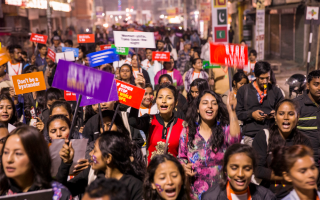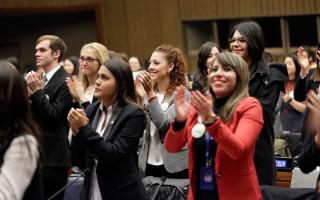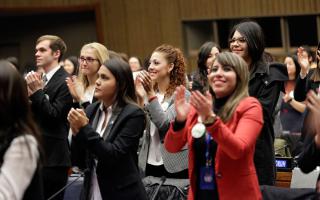The Children and Armed Conflict Advanced Course
Applications for this edition is now closed
Children are the primary victims of armed conflict and are disproportionally affected by it. Protecting them is a moral, legal and strategic imperative and failing to protect them risks undermining sustainable peace, stability and development. To better address the situation of conflict-affected children and prevent grave violations, broad partnerships and professionals trained in child rights and protection are essential. The Children and Armed Conflict (CAAC) Advanced Training is designed to equip participants with the necessary skills and competencies to effectively address these issues and enhance the safety and well-being of children affected by conflict.
The Office of the Special Representative of the UN Secretary-General for Children and Armed Conflict (OSRSG-CAAC), in collaboration with the United Nations System Staff College (UNSSC), and the financial support of the Ministry for Foreign and European Affairs and Trade for the Republic of Malta, is organizing an Advanced Training on Children and Armed Conflict.
This advanced training builds on the experiences and lessons learned from the 2022 Virtual Summer School on Child Protection in Armed Conflict, and it complements the knowledge acquired by participants through the CAAC Primer, a self-paced online course co-developed by the OSRSG-CAAC and the UNSSC.
Both trainings aim to raise awareness and strengthen knowledge about the CAAC agenda to enable participants to contribute to its implementation through their work. While the CAAC Primer is meant to provide an introductory knowledge, this advanced training will delve more into detail in some key areas of the CAAC agenda. Through practical exercises and discussions, it further seeks to develop skills and competencies to empower and enable participants to translate knowledge into practice, including by building partnerships and establishing inter-sectoral collaborations.
By the end of the advanced training, participants will be able to:
- Contribute to the implementation of the CAAC agenda and the protection of children affected by armed conflict;
- Mainstream the CAAC agenda into a wide range of related topics and in different fora;
- Confidently advocate for ending and preventing grave violations against children;
- Build and strengthen partnerships and establish inter-sectoral collaboration.
The training is delivered entirely online. A stable internet connection and appropriate equipment (an electronic device to connect, headphones, microphone, and camera) will be needed. The course is hosted on the UNSSC online learning platform, which allows a high degree of flexibility to access content from anywhere and at any time.
This online path is divided into two parts:
- Part I – CAAC Primer: Self-paced online learning of around 4.5 hours to be completed before the start of Part II. The CAAC Primer will provide introductory knowledge and common understanding of the CAAC agenda.
- Part II – Advanced Training: Eight live sessions of 2.5 hours per week (from mid-November to the end of January), which combine presentations, open discussions with experts, and practice-oriented exercises. The sessions will offer a dynamic learning environment seeking the engagement and active participation of participants through collaborative activities tailored to adult audiences and online teaching.
During the course, there will be dedicated moments for experience sharing, joint reflection, peer-to-peer learning, and opportunities to build partnerships and establish inter-sectoral collaborations. UNSSC and OSRSG-CAAC facilitators will guide and interact with participants throughout the course.
Certification by UNSSC and OSRSG-CAAC will be issued upon completion of the CAAC Primer and participation in at least 7 out of the 8 live sessions of the advanced training.
Part I – CAAC Primer
- Module 1 – Introduction to the Children and Armed Conflict agenda;
- Module 2 – The six grave violations against children;
- Module 3 – Key CAAC actors and partners and their roles;
- Module 4 – The CAAC toolbox
Part II – Advanced Training
The following topics will be tentatively covered during the eight live sessions:
- Impact of armed conflict in populated areas;
- Engagement with parties to the conflict (state/non-state actors);
- Prevention and child-sensitive conflict analysis;
- Child-sensitive mediation;
- Release and reintegration of children formerly associated with armed forces and armed groups;
- Accountability and justice for children affected by armed conflict.
This training targets a diverse range of professionals, including staff members from the UN system, governments, military, regional organizations, non-governmental organizations, civil society, and academia working on CAAC or in a related area.
Admission requirements
Applicants must:
- Have a basic understanding of, and a professional interest in, the CAAC agenda;
- Hold at least a BA in Law, political science or international relations, or bring equivalent professional experience in a relevant field;
- Have an advanced English level (C1 CEFR level);
- Commit to actively participate in the training.
In applying, the potential selected participants commit to actively participate during the training and to complete the above-mentioned CAAC Primer ahead of the first live session.
Selection criteria
The selection criteria include quality of motivation, relevant experience and knowledge, commitment, diversity (gender, geographic region, sector, etc.), and willingness to contribute to the course.
Thanks to the generous support of the Office of the Deputy Prime Minister and Ministry for Foreign and European Affairs and Trade of Malta, the Children and Armed Conflict Advanced Training is offered free of charge.
Photo credit: UNICEF/UNI482372/Khan


